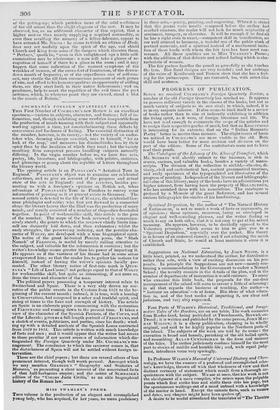COCHRANE'S FOREIGN QUARTERLY REVIEW. THIS First Number of Coctiassts's new
Review is an excellent specimen,—various in subjects, character, and feature; full of in- formation, and, though exhibiting some crudities inseparable from the production of minds teeming with their subject and apparently working against a time, yet counterbalancing these defects by earnestness and freshness of feeling. The essential distinction of the number, however, is its variety,—not the variety of an under- taker who, deeming change essential, says to himself, " let us look at the map," and measures his dissimilitudes less by their spirit than by the localities of which they treat ; but the variety resulting from competent persons handling subjects naturally differing. In the virgin number before us, we have fine arts, poetry, life, literature, and bibliography, with politics, statistics, and gleanings or gossip about the republic of letters throughout the literary world.
The opening article 13 on PASSAVANT'S " Artistical Tour in Enp,land.' PASSAVANT'S object was to examine our celebrated collections, awl to give an account of the progress and actual state of the arts in England : and the reviewer, besides pre- senting us with a foreigner's opinions on British art, takes advantage of PASSAVANT'S Tour in Flanders to convey some infurmation of painting as it at present exists in Germany. The second article is devoted to the life of WossT, the celebrated Ger- man philologist and critic; who first put forward in a connected shape the literary heresy that the lliad was the production of many minds, and merely consisted of a moldier of rhapsodies dovetailed together. In point of workmanlike skill, this article is the gem of the number. The scope of the book reviewed is comprehen- sively stated ; the points to which the reviewer chiefly limits him- self are distinctly laid down, and then exhausted; whilst the early struggles, the persevering industry, and the peculiar cha- racter of WOLFF, are developed with a true biographical spirit. The notice of the great historical Persian poem, the " Shah Nameh" of FEanousi, is useful by merely calling attention to the subject, and valuable for the information it contains; but the writer's knowledge seems greater than his power of imparting it. He appears as if the vastness of' his theme had in some sense overpowered him; so that the reader has to gather his notions for himself, instead of having the wri:er's opinions lucidly pre- sented. The other literary notice of first-rate mark is Quist- TANA'S " Life of Las Casas; not perhaps equal to that of WOLFF for workmanlike skill, but quite as interesting, if not more so, from the times and character of the man; The political papers possessing a temporary interest relate to Switzerland and Spain. There is a very ably drawn up nar- rative of the public events in the Cantons from 1831 to the be- ginning of the current month; imbued, it is true, with a leaning to Conservatism, but composed in a sober and truthful spirit, and rising at times to the force and strength of history. The article on Spain is an elaborate paper commencing with the restoration of FERDINAND and coming down to the present time. It takes a view of the character of the Spanish Patriots, of the Cores, and of the Liberals; gives us a full-length portrait of FERDINAND, and a sketch of events, politicians, and parties, since his death; wind- ing up with a detailed analysis of the Spanish Loans contracted from 1820 to 1834. This article is written with much knowledge of facts and men ; and it would appear that the Writer had access to those peculiar if not secret sourc:s of information which dis- tinguished the Foreign Quarterly under Mr. COCHRANE'S ma- nagement. The conclusion to which the reviewer comes is, that the disturbances of Spain will not be settled without foreign in- tervention.
These are the chief papers; but there are several others of less prominent interest, though well worth perusal. Amongst which we may meution GRABERG'S " Geography and Statistics of Morocco," as presenting a clear account of the ascertained facts of that half-barbarous empire; • and the notice of SCHRADER'S edition of the "Corpus Juris Civilis," as an able biographical history of the Roman law.


























 Previous page
Previous page